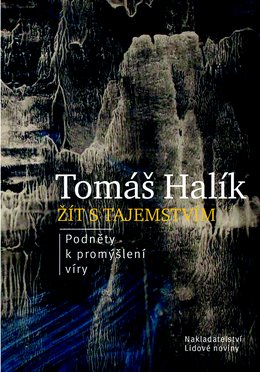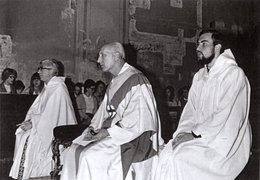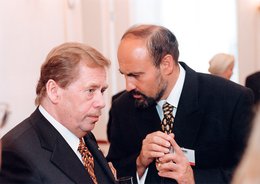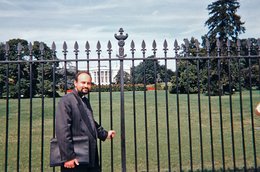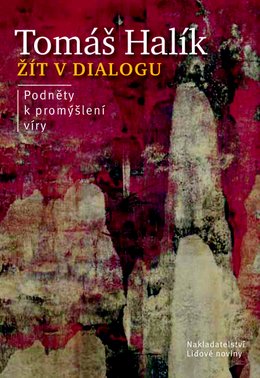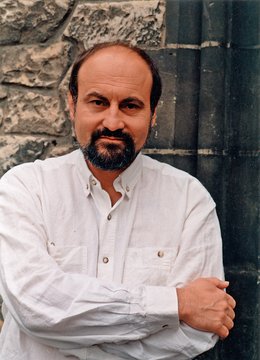The first four decades of Tomáš Halík’s life coincided with the duration of Communist Czechoslovakia. As a clandestine Catholic priest active in dissident intellectual as well as Church circles, he witnessed—and helped shape—developments which contributed to the Velvet Revolution, the peaceful wave of protest that brought down the Communist regime in December 1989. He liaised, among others, with the dissident writer Václav Havel—who would become the first president of post-Communist Czechoslovakia—and Pope John Paul II.
Now in his early seventies, Monsignor Professor Halík continues to minister at the baroque Church of St. Salvator [the Holy Savior] in central Prague, which was overflowing with students on the dark November evening when the editor of the East-West Church Report visited. He is well known locally for his accessible writings on theology: Catholics and Protestants in now-independent Slovakia both referenced these when interviewed by the Report’s editor in 2017. Some of Monsignor Professor Halík’s works have also won international acclaim, particularly Patience with God: The Story of Zacchaeus Continuing in Us, which has been translated into six languages. Monsignor Professor Halík followed Archbishop Desmond Tutu and the Dalai Lama as recipient of the prestigious Templeton Prize in 2014.
Monsignor Professor Halík’s autobiography in English translation—From the Underground Church to Freedom— was published in October 2019. Soon afterwards he met the editor of the East-West Church Report in a Prague café to discuss his singular life experience. The interview took place in English.
You were born in 1948, just as Czechoslovakia fell under Communist rule. How did you come to be an active Catholic?
I was baptized as a child, but I grew up without any sort of religious education. In practice, I converted in the late 1960s. Around the time of the Prague Spring [January-August 1968] I met several priests who had spent many years in prison. Some of them were leading theologians, like Josef Zvěřina, Oto Mádr, and Antonin Mandl. It was due to their influence that I started to think about becoming a priest.
And you were also able to travel abroad at this time?
Yes. Before the Prague Spring it was very difficult, and afterwards it was quite impossible for anyone who did not have connections with the Communist Party. But there was a short period during the Prague Spring when anyone could travel to the West, and many students made use of this opportunity—especially to go to Britain, because they were interested in learning English. So I spent some time during my holidays on an English course at Bangor University in North Wales. My father had been editor of the works of the Czech writer Karel Čapek, and Bohuslava Bradbrook, the wife of a Bangor professor, was also a specialist on Čapek. She invited me, but the last day of my holiday—21 August 1968—was the day of the Russian occupation of Czechoslovakia. So I was offered the possibility of studying at Bangor, and I stayed on.
During the Prague Spring, Czech Catholic intellectuals suggested that the Church should not remain on the sidelines, as the popular demands for reform concerned the whole of society.
Yes. In 1968 some Catholic intellectuals and priests— many of whom had spent long years in prison—decided to greet the Prague Spring as an opportunity to take part in the new political situation, hoping some sort of liberalization of the Communist regime would follow. We gathered in March 1968, and in May we travelled to Velehrad—a Catholic pilgrimage site in the region of Moravia. There we founded a renewal movement in the spirit of Vatican II. We also planned to establish new Catholic radio programming and publishing activity, but the majority of this was suppressed after several months, under the Russian military occupation.
For a year or two some possibilities to publish remained. Persecution was not immediate after the occupation; the so-called “normalization” of the regime was introduced step-by-step. This was quite clever, because it meant that we kept hoping: “Okay, the Russian tanks are here, the situation will not be so open as we dreamed, but there will still be some possibilities.” But step-by-step it became worse and worse. While it was not so drastic as in the Stalinist period of the 1950s—there were no executions or 20- year prison terms—it was more sophisticated. Secret police were everywhere, and the psychological pressure people were under destroyed the moral climate in society—perhaps even more than in the 1950s, when everything was black and white.
Was the window of greater freedom afforded by the Prague Spring closed by the time you chose to study to become a priest in the early 1970s?
Formally, there was a seminary for priests, but it was totally controlled by the secret police. Students were not allowed to enter if they already had a university degree. There was no possibility for me to enter because I had already completed my studies in philosophy and sociology at Charles University in Prague. Also, I already had some contacts with dissidents, including Václav Havel.
Furthermore, my intention was to work in another way than the priests in the officially recognized parishes. I felt my vocation was to work with students and academics—the intelligentsia—because this was the milieu that I knew very well. The only possibility for that was in the underground Church.
What form did the underground Catholic Church take in Communist Czechoslovakia?
It was not a united organization—there were several groups. One part consisted of priests who had been officially ordained but who had lost their government permission to serve as priests. All these official priests were practically in a schizophrenic situation. They were paid by the state, but if they performed their work well—if they had a full church, or the interest of young people—they were punished. Everywhere there were Communist-appointed secretaries for church affairs who controlled everything, especially the priests, and they had the power to take away their permission without any explanation. If a priest had some kind of activity with young people, he was especially likely to be punished. Some were sent to regions near the border, which was practically a religious desert. Or, their permission was taken away completely, and they had to work as a window cleaner or janitor. So they worked in such jobs while continuing to perform some priestly activity in private apartments.
Another part of the underground Church were priests who had been secretly ordained by bishops who had themselves been secretly ordained. Even prior to the Communist putsch in 1948, Pope Pius XII expected hard persecution of the Church, so he allowed the secret ordination of bishops for this time of persecution. But practically all of these secretly ordained bishops were discovered and arrested by the Communist secret police. Some of them used the last moment before they were taken into prison to ordain another bishop. However, this was without a decision of the Holy See, so things became complicated from the point of view of canon law.
The third part of the underground Church were priests who were ordained by bishops in other so-called socialist countries, such as Poland and East Germany, to which we were allowed to travel. I was ordained a priest in East Germany in 1978, in the private chapel of the bishop of Erfurt.
And there were very few people who knew you were a priest?
Yes, even my mother was not allowed to know about it. There had been damaging experience of family members telling others, and of that information being passed on.
How did the ordination take place?
In the autumn of 1978 I was awaiting an invitation to go to Erfurt for my priestly ordination. Then Pope John Paul I died suddenly, and we thought that might put a stop to the process. Among the bishops there were different attitudes towards the underground Church—some were more cautious about supporting it. In time the date I should be in Erfurt was clandestinely communicated to me: 20 October. So I went there, received my ordination, and celebrated my first Mass with the then auxiliary bishop of Erfurt, Joachim Meisner, in a monastery chapel.
There were monasteries in East Germany at this time?
Yes, the persecution in East Germany was not so drastic as in our country. The Catholic Church there was in a sort of ghetto— they were isolated from society—but inside this ghetto there were some possibilities which we did not have.
In Czechoslovakia, monastic orders had been shut down by the Communist authorities in 1950, in the Action K Operation.
Yes, there was no real monastic life. There were only several houses where old nuns lived, who were allowed to care for even older nuns or disabled children, for example. There was an attempt during the Prague Spring to revive monastic orders along with other Church institutions, but this was stopped.
You became a priest just as Karol Wojtyła was elected Pope John Paul II. How did you feel when you heard of his election, especially given his similar background as a priest in Communist Poland?
John Paul II had been elected a few days before my ordination, on 16 October. Immediately after my first Mass I went to the bishop’s apartment to watch the papal inauguration on Western television, which it was possible to view in that part of East Germany. His famous first sermon—“Do not be afraid!” —was a good motto for my future activity.
Did your status as a clandestine priest allow you to work in an academic milieu?
No, I was not allowed to teach at the university after my first conflict with the Communist regime. At my doctoral award ceremony I did not give the expected speech of thanks to the Communist Party, but instead honored our professors who had been expelled from the university. I ended my speech with a quotation from Karel Čapek: “Truth is greater than power.”
So I had a different civil profession. To begin with I worked as a sociologist, but in that role I also experienced some pressure from the secret police. For the last seven years of the Communist regime I worked as a psychotherapist to alcoholics and drug addicts.
How did you pursue your vocation of ministering to the intelligentsia?
Some priests in the underground Church, including myself, were in contact with other groups of dissenters. There was religious dissent—our underground Church; political dissent such as the Charter 77 human-rights initiative; also cultural or intellectual dissent—lectures in private apartments, samizdat [Russian: self-published literature], and so on. I built bridges between the religious dissent and this intellectual dissent. Part of the intellectual dissent was Christian, and some of the lectures in private apartments were on theological and philosophical topics. Some theology professors and intellectuals came from the West to lecture to us, including some quite famous names, like Cardinal [Christoph] Schönborn and Cardinal [Walter] Kasper, Hans Küng, and Johann Baptist Metz. There were also some philosophers, like Charles Taylor and Jacques Derrida. They came just for the weekend as private tourists, and we organized the lectures. There was a lot of conspiracy involved!
How risky was your activity?
We had to be careful. I did not tell many of my friends from Charter 77 that I was a priest. Some people there were very close friends of mine, and they knew about my activity, but it was customary practice only to give and receive information that was really necessary. This was because nobody knew what would happen during interrogation by the secret police. There could be some violence—beatings—during interrogation. For example, Václav Malý [now auxiliary bishop of Prague] was a dissident who built bridges between religious dissent and the political dissent of Charter 77. He was beaten by the secret police during interrogation.
Were you ever interrogated or beaten?
I was interrogated by the secret police several times. They had a suspicion that I had some contact with the underground Church and also with some of the dissidents, but they could not prove it, so I was not arrested. I was never beaten.
Did the underground Church also co-ordinate closely with official Catholic structures in Czechoslovakia?
Yes. Part of the official Church were collaborators and agents of the secret police, but there were also others who were quite honest, so there was not much of a strong division between the official and underground Church.
It must have been challenging for you to liaise with those in the official Church.
The secret police were everywhere, and there was a special law on violating state control of the churches. The typical punishment was two years in prison, but if contact with foreign countries like the Vatican was involved, it could be even worse. We knew there were microphones in many apartments. So we had to be careful and act as in some sort of conspiracy. We had some techniques for how to avoid secret surveillance. Cardinal Reinhard Marx in Munich once told me that he visited our Archbishop [František] Tomášek in Prague in those days and asked him: “Your Excellency, can we speak openly here?” Tomášek said yes, at the same time vigorously shaking his head to indicate no.
In your autobiography you describe how, when you visited Fr. Oto Mádr, he left a faucet running to obscure the conversation. Instead of a spoken conversation, there were also times when you exchanged written notes and destroyed them as soon as they had been read. How did such a conspiratorial existence affect your relations with the wider Catholic Church?
We were not so isolated from the theological and philosophical thinking in the West—but that was in our relatively small circles. After the fall of Communism, I discovered that persecution had a very destructive effect upon the intellectual level of the Church. Slight persecution is always good for the Church, but under very strong persecution the majority of our priests were isolated from the development of the Church in the West. As a result, there was some culture shock following the fall of Communism. Acceptance of the reforms of Vatican II was too superficial in our country, because our priests had no opportunity to study the authors who created the intellectual background of Vatican II. Without this intellectual background, the reforms were just formal, very superficial. We moved the altar, we switched from Latin to our native language, and so on, but the spirit of Vatican II was not well understood by many priests.
Paradoxically, an exception to this was those priests who had been most isolated—the priests who were in prison, including my mentors, Fathers Zvěřina, Mádr, and Mandl. In prison they experienced practical ecumenism with Protestants and some nonbelievers, and they discovered that they had much in common. They dreamed about the future Church being a fuller Church— an ecumenical, serving, and open-minded Church. Some of them also understood and accepted these hard years in prison as a sort of pedagogy from God: a form of purification of the Church, or punishment for its clericalism and triumphalism. When they left prison in the late 1960s and received the first information about Vatican II, they said: “Ah yes, this is exactly what we dreamed about in prison.”
How much impact did theological thinking have upon the political dissident movement, especially after Charter 77? Its most prominent symbol, Václav Havel, was not an overtly religious person.
The wider context is this: I think that the Communist regime in Moscow, which controlled all the regimes in the satellite states of the Eastern bloc, decided to choose Czechoslovakia— and especially Bohemia—as a field of experiment for total atheization. We already had some anticlerical tensions during the First Czechoslovak Republic [1918-38], and some tension between national identity and Catholic identity due to the Hussite Wars in the early 1400s and violent re-Catholicization in the 17th century. The situation was quite different in Poland, where the Catholic Church was a pillar of national identity against Orthodox Russia and Protestant Prussia. Czechoslovakia was a relatively secularized country even before the Second World War. The Communists decided to finish this off by creating an absolutely atheist country. But in Czech national psychology there is always sympathy with the persecuted, so this pressure had the opposite effect. The priests in prison in the 1950s made a great impression upon the other prisoners, for instance. The moral authority of the Catholic Church grew, especially in the big cities, among intellectuals and young people. In the 1970s and 80s, there were many sympathizers and converts.
There is something peculiar in the Czech national mindset: practically none of the important Czech cultural figures of the 20th century identified fully with the Church—but none were atheists. The most typical trait was a sort of open humanism with some transcendental dimension. Sometimes I call it “something-ism”: “I don’t believe in God, I don’t go to church, but there must be something.” This “something-ism” is the most widespread religion in our country.
The ethical dimension of Christianity in particular was accepted by such humanists, people like Karel Čapek. Václav Havel, too, was a humanist with a spiritual and very strong ethical dimension. During his time in prison he met Catholics like today’s Archbishop [of Prague, Dominik] Duka, and the dissident and later senator Václav Benda, among others. In the 1970s and 80s Havel and his brother Ivan hosted private house lectures on philosophy. I delivered some, including on the Catholic philosopher Gabriel Marcel, French personalism, and religious thought. The Catholic philosopher and natural scientist Zdeněk Neubauer—a special man—had a great influence on the thinking of Václav Havel. So Havel had some good friends among the Catholic intellectuals. He was deeply interested in religion—a spiritual man, if not fully identified with the Church. He was greatly interested in interreligious dialogue, Oriental spirituality. But he always said, “I was baptized, I received confirmation, I am Catholic, and I feel like I am on the same ship as the Christians.”
How significant a role do you think the Catholic Church in Czechoslovakia played in bringing about the Velvet Revolution of 1989?
Our Cardinal Tomášek was very cautious at first, and this was perhaps the reason why the Communists decided to let him take over in Prague after Cardinal [Josef] Beran was pushed to go into exile in Rome in 1965. They appointed Tomášek as the apostolic administrator—absolutely controlled by the state—and he was very cautious. He followed the policy of the Vatican at that time, which was “small steps”, or not provoking the Communists. But Tomášek was always very peaceable towards Rome and papal authority, so when it became clear in the late 1970s that Pope John Paul II supported a stronger line due to his personal experience of Communist rule, Cardinal Tomášek underwent a great change.
One reason was the election of John Paul II and his influence, but the second was Charter 77. When Charter 77 was published, the regime pushed Tomášek to say something against the Charter and so to distance the Church from it. Tomášek knew that some of the dissidents involved were former Communists, so he was somewhat distrustful anyway. After his statement was published, however, Fr. Josef Zvěřina and the most important theologians from among the dissidents approached him and said: “You cannot be against the people, they are fighting for justice, and we must be on the same side as them.” Cardinal Tomášek then selected three aides from the underground Church: Fr. Zvěřina, Fr. Oto Mádr, and myself. He was already in his eighties in the years leading up to the Velvet Revolution, so he needed some help. We prepared many documents, including some pastoral letters, but he signed them with his authority.
By the late 1980s Cardinal Tomášek became a symbol of the spiritual struggle against the Communist regime, one of the symbols of dissent. Catholics—and especially those in the underground Church—became an important part of the dissident movement. They were not the only part —not even the most important—but important nevertheless.
During a dramatic situation such as the Velvet Revolution, a spiritual-religious dimension to society always emerges. The people become more sensitive to religious and spiritual values in such a dramatic situation. The demonstrations in November 1989 were on Wenceslas Square, where there is a statue of our national patron saint, St. Wenceslas. Václav Malý was the moderator of these demonstrations. He had been ordained a priest openly, but he lost his permission once he signed Charter 77, and he subsequently worked as a boilerman—quite a common job among dissidents! He had also spent time in prison and was well connected with Václav Havel, who by contrast was already relatively well known through Radio Free Europe and Voice of America. Many people were listening to Western radio, and this was the only way a lot of people not personally connected with the dissidents could receive information about them. Fr. Malý was not at all known, but he found himself at the nucleus of the Velvet Revolution.
Václav Malý prominently addressed the demonstration attended by three-quarters of a million people in Prague’s Letná Park on the last weekend of November 1989.
Václav Malý was a relatively young man then, but he was also a Catholic priest. He initiated something very important during that decisive demonstration in Letná Park. There was a young policeman who came to apologize to the crowd [for a brutal attack by riot police on a peaceful demonstration in central Prague on 17 November 1989]. Václav Malý then asked the people to pray the “Our Father,” with the focus on “Forgive us our trespasses, as we forgive those who trespass against us.” To many this came as a surprise; you could see how people tried to remember the words of the “Our Father.” But for me it was a very important psychological and spiritual moment. [Footage of this may be seen at “Druhá obří demonstrace na Letné (26.11.1989),” YouTube, 22 October 2012, from approximately 28.00 to 35.00.]
Prior to that, on 12 November 1989, [13th-century] St. Agnes of Prague was canonized by Pope John Paul II in Rome. This occasioned the first Mass broadcast on public television in Czechoslovakia, and 11,000 pilgrims were permitted to travel from our country to Rome for the canonization ceremony. That was my first possibility to meet John Paul II in person. I believe that event had an important impact upon the psychological climate of Czech society. When the demonstrations and all the dramatic events followed later in November, some began to call it “the Revolution of St. Agnes.” This was the most widespread name before some Western journalists named it the Velvet Revolution, by which it was subsequently known. But at the time, people said “the Revolution of St. Agnes” due to an old prophecy, which said that when Agnes would be canonized, there would be better times in our country. I cited this prophecy in a speech at the canonization ceremony in Rome. When I returned to Prague with Cardinal Tomášek, the Italian ambassador greeted us at the airport with, “Your Eminence, there is a revolution!”
How do you feel about the process of lustration [de-Communization, particularly disqualification of Communist officials from public office] since 1989? Has enough been done by the Czech Catholic Church in this sphere?
I was quite happy that the Velvet Revolution was truly “velvet.” It did not follow a Jacobin path: there was no hunting down of enemies, revenge, or violence. But I am afraid that the process afterwards followed the other extreme—trivialization of guilt. One extreme is witch-hunting and revenge, but the other is just to forget about everything and say: “I was a dissident, you were an informer, and everything is okay.” I am afraid that is what has happened.
Forgiveness and reconciliation form the way between the two extremes, and the Church should be more active in this process of reconciliation and healing. I remember listening to an interview many years ago with [Soviet dissident author Aleksandr] Solzhenitsyn, in which he was asked what would follow the fall of Communism. His reply was: “Budet dolgaia doroga vyzdоrоvleniia”— “There will be a long road of healing.” I think that is true, because after the fall of a dictatorship, society is always sick. There are some people who want revenge, some people who are guilty, and in our case the guilt was very different from criminal guilt—just silence, passivity. Christians should be experts in reconciliation, and reconciliation is a process; it does not mean just saying that everything is okay. It is important to name the situation using the right name, and it is important for the people who are guilty to ask for forgiveness, and for there to be some sort of penance.
In our country, however, I think we moved a little too quickly. The [October 1991] law on lustration was important, but after Communism fell, the last Communists became the first capitalists. Some of them— especially those who had connections with the secret police, which was the cleverest part of the Communist regime—were the only people with financial capital, along with capital of information and capital of connections, and they used all this. They were not permitted to enter the political sphere directly because of the law on lustration, but they entered the business sphere and became a moneyed elite who began to influence the political sphere from behind the scenes. So the results of the Velvet Revolution were very mixed—some dissidents like Václav Havel became prominent figures in politics, but after him came former Communists and Václav Klaus [Havel’s successor as president from 2003-13] with his ideology. They think that the market can solve all problems. It is rather like the economic determinism of Marxism in reverse. Whereas the Communists expected that, with the socialization of industry, a new socialist human being would be created, they expected that, after the privatization of industry, there would be a new capitalist human being with initiative and responsibility. But it doesn’t work out like that in practice!
When John Paul II was pope you were made a consultant to the Pontifical Council for Dialogue with Non-Believers. What has been your experience in this sphere in the Czech Republic?
People say that Czech society is the most atheist society in the world. I do not see things in this way. It is true that just a few people here fully identify with the churches, but there are also many sympathizers. In my book Patience with God, I liken this situation to the biblical story of Zacchaeus. After a long period, the Church once again has the opportunity to enter the public square, but we pay attention only to people who are applauding us and to some minorities who are against us. We do not mention that the trees along the way are full of Zacchaeuses; people who have some interest but prefer to maintain a certain distance. Jesus came up to Zacchaeus, called him by his name, and said, “I must be in your home.” I believe that it is most important to be in dialogue with these seekers, and I have found this to be my personal mission. In addition to my books, I founded the academic parish of St. Salvator, which is oriented towards students in Prague, and the Czech Christian Academy, which now has around 2,000 members in more than 60 towns and cities across the country [CCA]. Its volunteers organize public lectures in galleries, museums, and schools, which we find to be better venues than churches and parishes houses. We also invite people from outside the Church, and offer topics that are not just church-oriented, but more open. ♦
